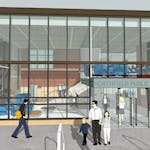South St. Paul is seeking help from Dakota County in dealing with what officials say is a disproportionate number of residents who receive state assistance because they are disabled and low-income, a category that includes senior citizens, people with mental and physical disabilities, and chemical dependency and mental health issues.
The City Council drafted a resolution in late August asking for help in alleviating what they say is a strain on city resources caused by too many police calls, some from disabled people who are part of the state's housing support program.
"Some of these calls, they're time consuming, they're mental health issues," said South St. Paul Police Chief Bill Messerich. "They usually involve two officers and they take longer than your average call."
The city wants the county to provide "an experienced social worker" to be housed at the police department, and it's asking for revisions to how the county's 911 dispatch center is funded so that the county levy covers the cost.
The city also raised public safety concerns, including the shooting of two South St. Paul police officers on July 19 by a man with a mental illness. Dustin Allen Bilderback, 33, had been living in a South St. Paul apartment and receiving services from the state when he injured two officers.
City Council Member Todd Podgorski, who spearheaded the resolution, said he's heard about high numbers of 911 calls for years, but the July incident spurred him to act.
"After seeing our officers shot, that really motivated me to have us do more," Podgorski said.
County officials said they were already responding to the city's concerns when the resolution was drafted. They recently pledged to hire a mental health coordinator to be shared by the West St. Paul and South St. Paul police departments. The county is also tracking the people who make frequent 911 calls and trying to determine why they're calling so often.
Dakota County Commissioner Kathleen Gaylord said there may be other reasons for the higher number of calls. South St. Paul is an aging community, she said, and older people may be calling more for medical assistance.
Podgorski, who is running against Gaylord for her commission seat, said the county's efforts aren't enough. "It's disappointing that it took such a critical incident to have them respond more appropriately," he said.
Podgorski said he wants the county to explore other options for housing people with mental illnesses, including building 16-bed mental health treatment centers.
Dakota County social services staff acknowledge that West St. Paul and South St. Paul have slightly more than their share of people receiving housing support. Those who qualify live independently but receive a rent voucher and may also receive services such as help with cleaning or money management.
Andrea Zuber, Dakota County social services director, suggested that the two cities might have more disabled and low-income tenants because accessible properties there are more affordable and available.
Messerich gave an example of one South St. Paul apartment building where residents receive housing support. In 2009, before it housed people with disabilities, residents called police 17 times. From 2011 to 2018, that same building averaged 57 calls a year. Properties where people receive housing support aren't the only reason for the increase in calls, Messerich said, but they are a significant factor.
Dakota County social services staff said they hope the July shooting doesn't further stigmatize people with disabilities — especially those with mental illness — or keep them from accessing services they need.
"We support thousands of people who have mental health challenges and disabilities across Dakota County who are living very peacefully and successfully," Zuber said.
Erin Adler • 612-673-1781



